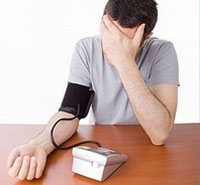Symptoms of Hypertension
 It’s a common mistake to think that people suffering from hypertension always experience its symptoms, but, actually, most patients with hypertension do not have any symptoms at all.
It’s a common mistake to think that people suffering from hypertension always experience its symptoms, but, actually, most patients with hypertension do not have any symptoms at all.
The first serious symptoms showing that a patient has hypertensive disease appear once the organs sensitive to increased arterial pressure are already affected. Let’s take a look at the main symptoms characterizing arterial hypertension:
- Headache – it appears at any time of the day, more often at night or upon waking up; it is felt as heaviness or burst in the back of the head or other parts of the head. Patients often complain of the feeling of ‘hoop’ on the head. Such pain increases when coughing or bowing and decreases after the massage, physical activity, or when a patient takes vertical position;
- Pains in the heart – such pains differ from the pains characteristic of angina, and are localized in the apex of heart and to the left of the breastbone. Pains appear when a patient is at rest, they last for a long time and do not disappear after taking nitroglycerine;
- Shortness of breath – it happens both during physical activity (in the early stages of the disease) and at rest;
- Leg swelling – it indicates heart failure or impaired renal excretory function;
- Vision problems – they indicate complicated blood circulation in the retina and are characterized by blurred vision or seeing black spots before the eyes, and sometimes a significant decrease in vision.
Primary hypertension is usually of an irregular nature. More severe forms of arterial hypertension are characterized by black spots in the eyes, numbness in the limbs, general weakness, speech difficulties, and that indicates changes in cerebral blood flow. Such signs of increased arterial pressure should by no means be ignored because the changes that cause these signs may lead to myocardial infarction or cerebral hemorrhage.
Hypertensive crisis is a characteristic symptom of arterial hypertension. It is a particularly severe manifestation of hypertension, when blood pressure suddenly rises to critical numbers and, as a result, the mechanisms of the brain circulation autoregulation become unproductive, intracranial pressure increases, and brain congestion accompanied with cerebral and focal signs (severe headache, dizziness, nausea or vomiting) develops. This condition may last for about a day regressing gradually.
Next chapter: Tests and diagnosis of Hypertension









